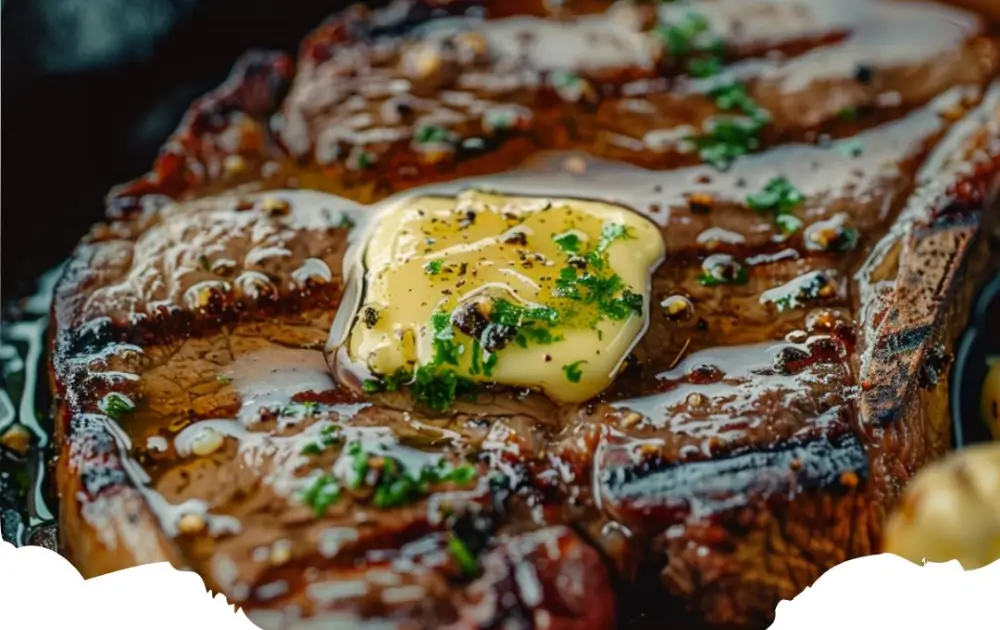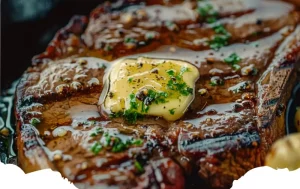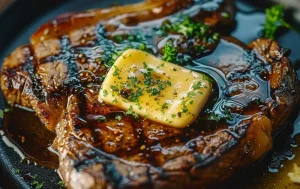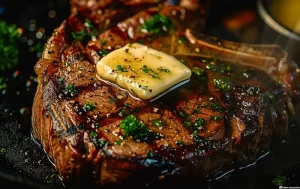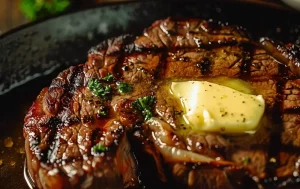World’s Best Steak Marinade is essential for enhancing the flavor and tenderness of steak before grilling or frying. A good marinade not only infuses the steak with flavor but also helps to tenderize the meat, ensuring a juicy, delicious result. Ingredients typically include acidic components like vinegar or citrus juice, oil, herbs, spices, and sometimes sweeteners. These elements work together to penetrate and season the meat, making even less tender cuts mouthwateringly tasty.
Print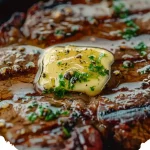
World’s Best Steak Marinade
- Author: recipstep
- Total Time: 57 minute
- Yield: Enough marinade for 2 to 4 steaks
- Diet: Gluten Free
Description
This Best Steak Marinade enhances the natural flavors of steak while tenderizing it for a juicy, delicious result. Perfect for grilling, this marinade combines savory, sweet, and tangy elements to create a complex flavor profile that complements any cut of steak.
Ingredients
1/3 cup soy sauce
1/3 cup lemon juice
1/2 cup olive oil
1/4 cup Worcestershire sauce
1 Tablespoon minced garlic
2 Tablespoons Italian seasoning
1 teaspoon pepper
1/2 teaspoon salt
Pinch of red pepper
1 1/2 pound steaks (rib eye or New York strip)
2 tablespoons butter
Fresh chopped parsley
Instructions
In a small bowl, whisk together soy sauce, lemon juice, olive oil, Worcestershire sauce, minced garlic, Italian seasoning, pepper, salt, and a pinch of red pepper.
Add steaks to a resealable zip lock bag or large bowl and pour the marinade on top. Marinate for 2 hours or overnight.
To cook the steaks in a skillet:
Turn the skillet to high heat.
Add the steaks and cook on each side for 3 minutes or until the outside is browned.
Reduce heat to medium-high.
Continue cooking the steaks to the desired doneness. For a medium-well result, it may take about 10 minutes, flipping 3 times.
Top the cooked steaks with butter and garnish with fresh parsley if desired.
Enjoy your perfectly marinated and cooked steaks!
Notes
- Do not marinate for more than 8 hours as the acids in the marinade can begin to break down the proteins excessively, making the meat mushy.
- Always refrigerate the steak while it marinates to prevent bacterial growth.
- Gluten-Free (ensure gluten-free soy sauce is used).
- Prep Time: 10 minutes
- Cook Time: 2 to 8 hours
- Category: Marinade
- Method: Marinating
- Cuisine: American
Nutrition
- Calories: 90
- Sugar: 6g
- Sodium: 800mg
- Fat: 7g
- Saturated Fat: 1g
- Carbohydrates: 7g
- Fiber: 0g
- Protein: 1g
- Cholesterol: 0mg
Frequently Asked Questions (FAQs)
How long should I marinate my steak?
For most steak cuts, marinating for 1 to 4 hours is sufficient. Tender cuts should marinate for shorter times, while tougher cuts can benefit from up to 24 hours. Always refrigerate your steak while it marinates to maintain food safety.
Can I reuse a marinade that has been used on raw meat?
No, you should not reuse a marinade that has come into contact with raw meat unless you boil it first. Boiling the marinade can kill any harmful bacteria, making it safe to use as a sauce or for basting.
What’s the best way to apply a marinade?
Place your steak and marinade in a resealable plastic bag or a shallow dish, ensuring the meat is fully submerged. For even distribution, flip the steak or rotate the bag several times during the marinating process.
Are there any alternatives to acidic ingredients for tenderizing the meat?
Yes, enzymatic tenderizers such as pineapple, papaya, kiwi, or Asian pear contain natural enzymes that can break down proteins and tenderize meat without the need for acids.
How does marinating affect the cooking time of steak?
Marinating can sometimes reduce cooking time slightly because the process of tenderization begins before cooking. However, the overall effect on cooking time is minimal, so always use a meat thermometer to ensure your steak is cooked to the desired doneness.
Key Ingredients and Their Roles
The effectiveness of a World’s Best Steak Marinade relies heavily on its components. Acids like lemon juice, balsamic vinegar, or wine help break down proteins, softening the meat. Oils such as olive or canola oil aid in keeping the steak moist during cooking and help the flavors of herbs and spices to adhere to the meat. Seasonings like garlic, rosemary, or soy sauce add depth and complexity, while ingredients like honey or brown sugar can offer a caramelized crust when cooked at high temperatures.
Preparation Techniques
To prepare a World’s Best Steak Marinade, combine all ingredients in a bowl or resealable plastic bag, ensuring that they are thoroughly mixed. Place the steaks in the marinade, ensuring they are fully immersed, and then refrigerate. Marinating times can vary depending on the desired intensity of flavor and the type of acid used, generally ranging from 30 minutes to overnight. It is crucial not to marinate for too long, especially with marinades high in acid, to prevent the meat from becoming mushy.
Marinating Tips for Optimal Flavor
For optimal flavor absorption, pierce the steaks lightly with a fork before marinating. This creates small channels in the meat, allowing the marinade to penetrate deeper. Always marinate in the refrigerator to keep the steak at a safe temperature. To ensure even flavor distribution, turn the steaks occasionally throughout the marinating process. For those looking to avoid added sugars, herbs, spices, and oil-based marinades offer a robust flavor without sweetness.
Pairing Marinades with Different Steak Cuts
Different steak cuts may benefit from specific marinades. Tougher cuts like flank or skirt steak are ideal candidates for more acidic marinades to help break down tougher muscle fibers. More tender cuts, such as ribeye or sirloin, might require only a brief marinating time in a less acidic mixture to enhance the natural flavor. Experimenting with various marinade ingredients like citrus, vinegars, and different oils can complement the natural flavors of the steak and enhance the overall dining experience.
Customizing Marinades for Personal Taste
Experimenting with different ingredients allows for customization of World’s Best Steak Marinade to suit personal tastes. For a more savory flavor, ingredients like Worcestershire sauce, Dijon mustard, or anchovy paste can be added. Those with a preference for spiciness might incorporate chili flakes, cayenne pepper, or freshly chopped chilies. For a more herbaceous note, consider mixing in fresh herbs such as thyme, oregano, or cilantro. Each addition modifies the marinade’s profile, providing a unique taste experience.
Utilizing Marinades as Sauces
After marinating, the leftover marinade can be transformed into a sauce to accompany the cooked steak. To do this safely, ensure that the marinade is boiled for several minutes to eliminate any harmful bacteria. This can be thickened with a small amount of cornstarch dissolved in water to create a richer, more velvety sauce. Alternatively, fresh marinade ingredients can be set aside before marinating the meat and used as a base for a side sauce to ensure safety without the need for boiling.
Impact of Marinade Time on Steak Quality
The length of time a steak spends marinating has a significant impact on both the flavor and texture of the meat. Shorter marinating times are sufficient for tender cuts, as these primarily need only a surface enhancement. In contrast, tougher cuts benefit from longer marinating times, which penetrate deeper into the meat. However, marinating any steak too long, especially in a highly acidic marinade, can lead to a breakdown of muscle fibers, resulting in a mushy texture.
Marinating and Cooking Methods
Different cooking methods can influence the choice of marinade. For grilling, a marinade with oil and high-heat tolerant ingredients like garlic and herbs is ideal, as it helps prevent sticking and enhances flavor under intense heat. For pan-searing, simpler marinades with high smoke-point oils and minimal sugars prevent burning and create a delicious crust. Adapting the marinade to match the cooking method ensures that the steak not only tastes great but also cooks properly.
Storing and Reusing Marinades
Proper storage of marinades is crucial for safety and quality. Unused marinade can be stored in the refrigerator for up to a week if it is prepared and kept in airtight conditions. If a marinade has been used with raw meat, it should not be reused as is due to the risk of bacterial contamination. However, if you wish to reuse it, boiling the marinade will make it safe for consumption again, though always taste it after heating to ensure the flavor remains appealing.
Seasonal Variations in Marinade Recipes
Incorporating seasonal ingredients into World’s Best Steak Marinade can enhance the dining experience by aligning the flavors with the time of year. Spring marinades might feature lemon zest and fresh parsley to echo the freshness of the season. In summer, bold, spicy elements like fresh basil and smoked paprika complement the smoky flavors of barbequed meat. Autumn calls for ingredients like rosemary and sage, which pair well with the richer dishes typically served during cooler months. For winter, a marinade with hearty ingredients such as juniper berries and cloves can add a warming touch suitable for indoor cooking methods like broiling or pan-searing.
Health-Conscious Marinade Options
For those mindful of health and dietary restrictions, modifying World’s Best Steak Marinade can make indulgent cuts of steak more suitable. Using ingredients like balsamic vinegar and citrus juices instead of oil reduces the overall fat content while still imparting a rich flavor. Including spices such as turmeric and ginger not only adds unique flavors but also provides anti-inflammatory benefits. Swapping out sugar or honey with natural sweeteners like crushed ripe pear can offer a subtle sweetness without the added sugar content, making the marinade both delicious and more nutritious.
The Science Behind Marinades
Understanding the science behind marinades can improve your cooking results significantly. Acidic ingredients in marinades, such as vinegar or citrus juice, help to break down proteins on the surface of the meat, which can make the outer layer more tender. However, if left too long, the meat can start to toughen again as the acids begin to denature the proteins excessively. Fat in marinades helps to transfer fat-soluble flavors into the meat and retain moisture during the cooking process. Lastly, aromatic compounds from herbs and spices dissolve in both the fat and the water components of the marinade, enhancing the meat’s flavor profile from the inside out.
Ethnic Inspirations for World’s Best Steak Marinade
Exploring ethnic marinades can introduce exciting new flavors to your culinary repertoire. For example, a Korean-inspired marinade might include ingredients like soy sauce, sesame oil, garlic, and sugar, perfect for adding depth to grilled steak. A Caribbean jerk marinade, with allspice, thyme, and fiery Scotch bonnet peppers, offers a spicy kick. Mediterranean marinades utilize olive oil, lemon juice, garlic, and herbs like oregano, which are excellent for a light summer feast. Each of these can transform a simple steak into an international delicacy.
Pairing Marinades with Specific Steak Cuts
Matching the right marinade with the appropriate steak cut can maximize both flavor and texture. Tender cuts like filet mignon benefit from subtle, less acidic marinades since they require less tenderization. More robust cuts, such as flank or skirt steak, can handle and benefit from bolder, more acidic marinades that penetrate deeply and tenderize effectively. For cuts with more fat, like ribeye, consider sweeter marinades that can caramelize upon cooking, providing a perfect crust and rich flavor. This thoughtful pairing ensures that each steak is showcased at its best.
Conclusion
Steak marinades are a fantastic way to enhance the flavor and tenderness of your steak. By understanding the roles of different ingredients in a marinade, you can customize your own blends to match your flavor preferences and dietary needs. Whether you’re preparing a quick weekday dinner or hosting a weekend barbecue, the right marinade can elevate your steak from good to gourmet. Experiment with various ingredients and techniques to discover your perfect steak marinade, and enjoy the delicious results of your culinary creations.

